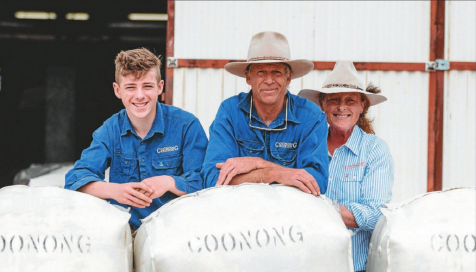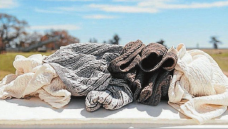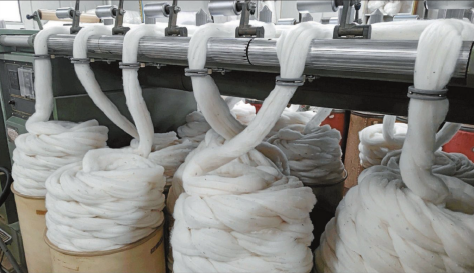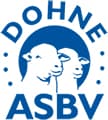Ethically grown wool
BY RUTH SCHWAGER ACM
Dohnes the perfect fit for Aussie brand
WHEN three women passionate about wool set out to establish a natural wool brand, they couldn’t imagine their stock would sell out to international customers, but the team at Ethical Outback Wool did just that and now they’re trying to keep up with demand for high quality, ethically and naturally-produced Dohne wool.
The business, based at Coonong Station, Urana, in southern NSW, was created by Sophie Holt, Kimmy Falls and Maggie Lahore with a goal to produce the most natural woollen products from wool produced on the property.
“We started in the middle of the drought, when Maggie and I were talking about wool and wool products, and how you couldn’t find Australian-made baby blankets, or products with a story where you know where the wool’s come from,” Mrs Holt said.
“Maggie was on a working holiday here, but she’s from a farm in Argentina, so she’s very much involved in the farm side and the Certified Humane program.
“That conversation led to a massive learning curve in the textile industry and when we got to the point where we had something to sell, that’s where Kimmy came in, because she had an online shop, but also runs Falls Livestock Transport.
“Since then, Kimmy and Maggie have taken it on and are very much the heart and soul of Ethical Outback Wool.”
Four years later, the team is producing Certified Humane woollen products, from baby blankets to jumpers, gloves and scarves, to customers around the world.
“This year we sold out within weeks, with a lot of it going to New York and California,” Mrs Holt said.
“With all of our Australian made wool, there are no chemicals applied, and no colouring or dyeing, so it smells and feels like natural wool.
“It’s from non-mulesed sheep that are raised in extensive grasslands, labelled with the Certified Humane logo that North Americans can relate to.”

Animal welfare a longtime focus
For Mrs Holt, animal welfare is not just a policy it’s her passion.
She’s studying for her Masters in Animal Welfare Policy and Law through the University of Edinburgh in Scotland, currently finishing her dissertation and about to interview to start her PhD.
“It’s been a longtime passion of mine, particularly in farm animal management,” Mrs Holt said.
“When we were looking at making the blankets, we were already RWS (Responsible Wool Standard) certified, but we want to take it a step further with Certified Humane, because it’s a logo that’s well recognised by the North American consumer, and we already had a lot of the processes in place to become certified.”
Dohnes are a good fit for the program as they don’t need to be mulesed, but that makes up a very small part of the Certified Humane certification.
“Our sheep already had access to the five freedoms (freedom from hunger, thirst and malnutrition; fear and distress; physical and thermal discomfort; pain, injury and disease; and freedom to express normal patterns of behaviour) but we have to have a lot of protocols in place,” Mrs Holt said.
“They look at your land management, transport, euthanasia policies, lameness and the way you handle illness within the flock, pain relief, body condition scores, to having a trigger point to start supplementary feeding in drought. We have a massive farm manual that outlines everything and they’re very high standards, but it’s worthwhile as it’s a very well recognised logo in North America.”
Quality is key, from farm to fashion
“Ethical Outback Wool is a showcase of what the Dohne can do. Dohnes will handle anything that you throw at them and still produce magnificent wool.”
All woollen products sold through the Ethical Outback Wool brand are produced using wool grown at Coonong Station.
Mrs Holt oversees the entire operation, from classing with woolclasser Jason Southwell on farm to watching the production of the yarn.
“I get a lot of feedback from our processors about how the wool is going through the machines and it’s always really positive,” she said.
“Ethical Outback Wool is a showcase of what the Dohne can do.
“Their ability to survive, their do ability and their fertility is second to none, and with the wool quality, you’ve got the best of both worlds.
“Dohnes will handle anything that you throw at them and still produce magnificent wool.”
Decisions made on the property have a big impact on the quality of the fibre and therefore the wool, Mrs Holt said.
“What I’m doing at the end with the processing is a reflection of the work Jason is doing at the start of the supply chain. His classing decisions are having consistently good results in the factory.”

An entirely Australian production system
SETTING up the supply chain for Ethical Outback Wool was a big task, with the team spending months
searching for businesses to work with in Victoria.
“With 32,000 sheep I had lots of wool, but after speaking with about 50 mills and micro mills I was told I couldn’t process wool domestically.” Sophie Holt said.
“I even rang mills that advertise doing things domestically, but they actually get their wool spun offshore and the they knit it here in Australia.”
The wool is scoured at the EP Robinson at Geelong, then sent to Cashmere Connections at Bacchus Marsh for backcombing and top making. It then goes to Wangaratta to be spun, then back to Melbourne to be knotted.
“It’s fascinating to watch the wool go through each of those processes and seeing how different clips are processed each year.”
Having the entire processing system based in Australia is a big accomplishment.
“Buyers love the fact that they can hold something, know where it came from and know how it was raised and processed, with no chemicals or dyes.”
While the on-farm attributes of the Dohne fits well with the marketing side of the garment business, fibre is also a good fit for domestic production.
“Domestically we can only spin to a 2/28, so they don’t have the capacity to make the fine knits. The 18- to 19-micron Dohne wool is spun a bit heavier but we’re still getting that beautiful feel, drape and comfort factor even with the wool go through each of the heavier knits.”











 Facebook
Facebook YouTube
YouTube Instagram
Instagram